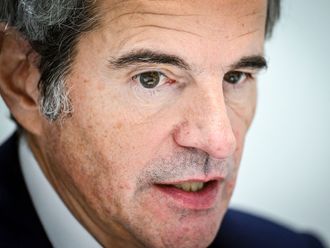London: Britain's prestigious London School of Economics was guilty of a "chapter of failures" during its close dealings with Libya's deposed Gaddafi regime, according to a report released Wednesday.
It singled out former LSE director Howard Davies' decision to let the school accept a $2.3m gift from a foundation run by Saif Al Islam Gaddafi, the son of former leader Muammar Gaddafi.
Davies resigned over the issue in March, as international outrage grew over Gaddafi's crackdown on the uprising in his country.
Oxford University
The report also revealed that Oxford University had rejected a request by the government of Britain's former prime minister Tony Blair to offer Saif Gaddafi a place there to smooth relations between Libya and the west.
The LSE had exposed itself to a "significant degree of risk", which materialised with Gaddafi's violent response to Libya's February uprising, said the report's author, former judge Harry Woolf.
There had been a "chapter of failures" in scrutinising the proposed donation, which was to be paid in five annual installments of #300,000, he wrote.
"The actual source of money gifted... was never established", the report added: "Saif Gaddafi's word alone was relied upon."
Woolf added that responsibility for the mistakes "must rest" with Davies, despite his "great experience and ability". Saif Gaddafi graduated from LSE with an MSc in philosophy, policy and social value in 2003 and a PhD in philosophy in 2008.
A separate investigation is probing claims that his PhD thesis contained plagiarised material.
'Purchased his degree'
The receipt of the first installment, six weeks after Gaddafi was awarded his PhD, was "unfortunate" and "risky", said the report and had led people to believe that he had "purchased his degree".
The university's North Africa programme was set up in 2009 with a grant from Saif Gaddafi's International Charity and Development Foundation. LSE said the foundation's grant came "without any academic restrictions" and was used to research human rights, democracy and civil society.
The school had also agreed a 2.2m euro deal to train Libya's civil servants before the uprising. Woolf said the school had been "naive" and had been driven by an "idealism factor", believing it could help Libya through Saif Gaddafi.
Woolf also wrote that Professor Valpy FitzGerald, the head of Oxford's Department of International Development, had told how a senior foreign ministry official had approached him in 2002 about getting Saif a place there.
Foreign Office
"It was made clear, he told me, that the (foreign office) would appreciate help in this case since Libya was opening up to the West again," Woolf wrote in a footnote to his report.
FitzGerald had responded that apart from the question of professional ethics, there was also an issue of whether an under-qualified student would be able to keep up. Once they had turned down the request on academic grounds, the ministry did not pursue the matter, FitzGerald added.
Ignored warnings
It was the LSE that asked Woolf in March to investigate why it had had ignored warnings that its reputation would be damaged by its links to the Gaddafi regime. He was given complete freedom as to how he went about his inquiry.
His report recommended that the LSE set up an ethics code to protect its reputation, create a body to monitor the admission of postgraduate students and adopt a fresh policy on outside donations.
The LSE said it accepted the report's recommendations.
"The publication of this report will help LSE move on from this unhappy chapter in its otherwise celebrated history," said LSE director Judith Rees on Wednesday.
"It is consoling that Lord Woolf finds that no academic or other staff member at LSE acted other than in what they perceived to be the best interests of the school," she added. "We will now work to take LSE forward".











